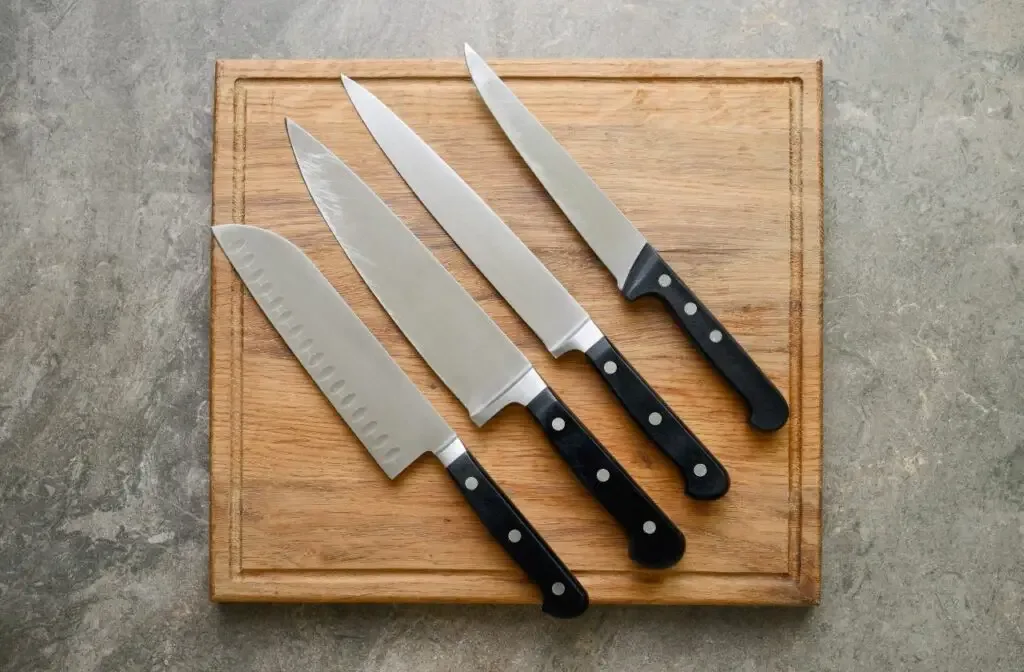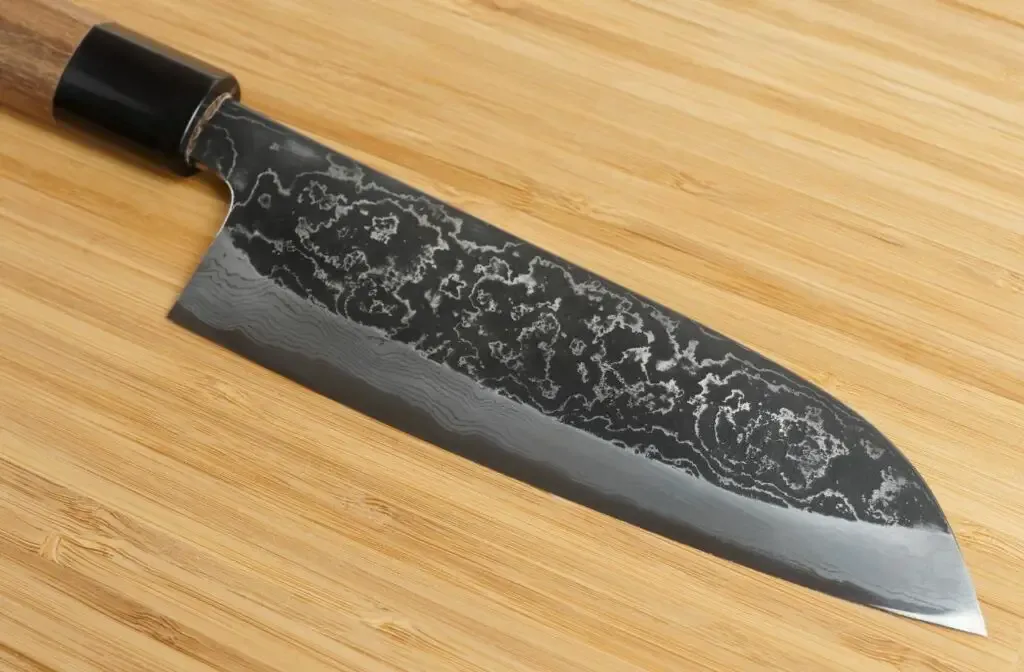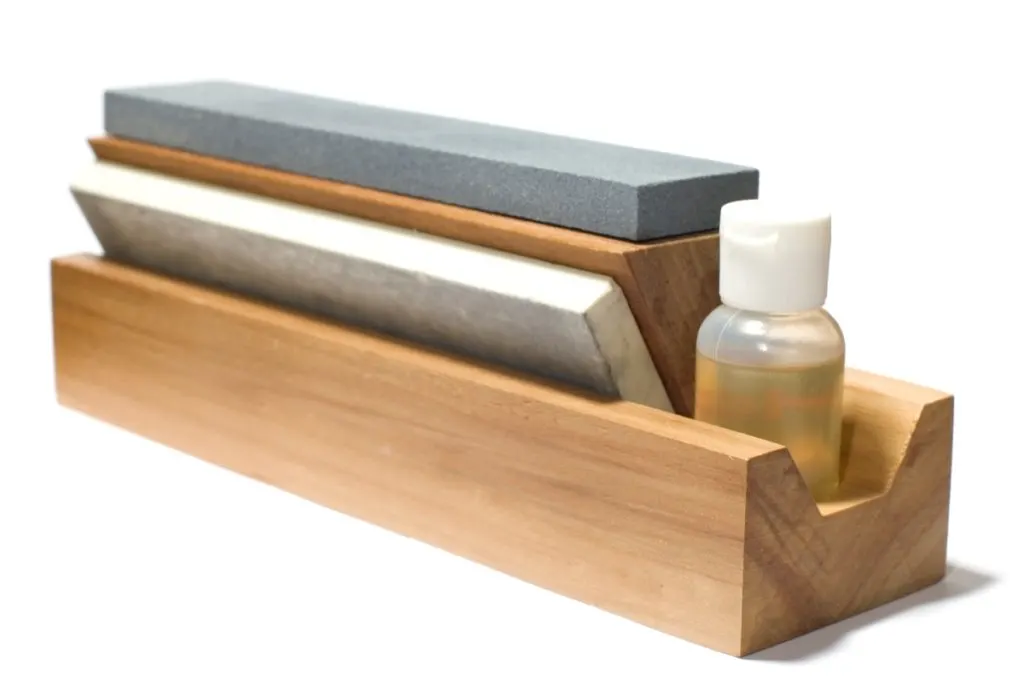As an Amazon Associate, we earn from qualifying purchases with no additional costs for you.
Kitchen knives can be expensive, but even if your knives are not top of the range, they still need care and maintenance. Part of that maintenance is keeping the blade in good condition and free from corrosion. Since kitchen knives are used to prepare food, additional care must be taken with knife care!
Protection with oil is a key part of maintenance for any kitchen knife. The oil must protect the steel from corrosion without posing the danger of contamination to food prepared with the knife. Food-grade mineral oil can be used, but a high-quality commercial knife oil is recommended.
Part of knife maintenance is protecting your knives from corrosion, which will extend the knife’s lifespan. Where kitchen knives are concerned, the importance of corrosion protection and what you use to oil your knife are of even more importance because the knives can contaminate the food. Should you be oiling your kitchen knives, and if so, what oil should you use?
If you are interested in checking out the best oil for kitchen knives we recommend and use, you can find them by clicking here (Amazon link).

Should You Oil Kitchen Knives?
Kitchen knives see a lot of use throughout the day and are probably the most used knives in your home. These knives suffer wear and tear from how they are used and the mix of ingredients they come into contact with.
You should be oiling your kitchen knives as part of their normal maintenance and care. The knives should be thoroughly washed after each use and given a light oiling before storage. Different types of knives may require a higher level of care in terms of oiling.
If you have Japanese kitchen knives or another kitchen knife made from high-carbon steel, oiling will be a necessity rather than an optional task.
The type of steel used in the manufacture of high-carbon steel knives gives certain desirable features to the steel, but one of the downsides of this type of steel is that it is susceptible to rust.
Rust can develop surprisingly fast on high-carbon steel blades, which is why oiling the knife to protect it from corrosion is a non-negotiable part of cleaning the knife.
Do Stainless Steel Knives Need Oiling?

Many people wrongly believe that stainless steel is immune to rust. This is not the case, and stainless steel is best described as rust-resistant rather than rust-proof.
Stainless steel knives do not develop rust as quickly as knives made from high-carbon steel, but a lack of care for stainless steel knives will result in the formation of rust on the blade.
While stainless steel knives do not require oiling as frequently as high-carbon steel blades, they will benefit from periodic oiling, particularly for long storage or after use with acidic ingredients.
TIP: Stainless steel knives quickly gained the reputation of being difficult to sharpen. But is that true? Check out the ultimate DIY guide on how to properly sharpen a stainless steel knife in the article below:
DIY Guide: Best Way To Sharpen A Stainless Steel Knife
How To Oil Kitchen Knives
Oiling kitchen knives is a relatively easy task, which is why it can be done easily and quickly when necessary.
There are two main requirements for a knife before it is oiled. It must be clean, and it must be completely dry. Application of the oils is as simple as daubing some oil onto a soft, dry cloth and wiping the oil evenly over the blade in a thin layer. The oil must be a food-grade oil.
You may argue that you cannot continually wash, dry, and oil a knife when you are using it throughout the meal preparation. You do not need to wash, dry, and oil the knife every time you use it during the food prep, but rather simply rinse it off and wipe it dry. When you are ready to pack the knife away, you can follow this procedure.
- Wash the knife blade. Wash the knife under warm running water. Apply a little dishwashing liquid to a cloth and clean the knife to remove all dried food and juices.
- Rinse the knife off. Rinse the soap off the knife under warm running water.
- Dry the knife. Use a clean, soft cloth to dry the blade completely.
- Oil the knife. Dab a drop of oil on a clean cloth and wipe it across the entire surface of the blade, leaving a thin layer of oil on the knife. Store the knife once oiled.
This process can be used for high-carbon steel blades as well as stainless steel blades. However, you do not need to oil stainless steel knives after every use.
Oil them after use on particularly harsh ingredients such as acidic foods such as tomatoes and citrus fruits, or if you will be storing the knife for an extended period.
Patina Is Your Friend On High-Carbon Steel Knives

One comment that bears mentioning is that the formation of a patina on a high-carbon steel knife is beneficial for the steel.
Patina is a form of oxidation, but unlike rust, it is non-corrosive oxidation and serves to protect the surface of the steel from normal red rust, which is damaging to the steel.
Do not scrub the patina off a high-carbon steel knife. It gives the knife character and helps protect the steel by limiting rust formation. It will minimize the frequency with which you need to oil the knife.
TIP: Many people new to high-carbon steel knives are a little perplexed when they see a patina developing on their expensive knives. Find out more about patina on a knife in the article below:
Patina On A Knife: Prevent Or Force It? In-Depth Explanation
What Oil To Use On Kitchen Knives?

There are a variety of oils that you can use on kitchen knife blades to protect the steel. However, you need to be a little more selective on the oil you use on knives used for food preparation.
Some people wipe their kitchen knives down with a layer of vegetable oil, but I do not recommend this practice. Vegetable oil becomes rancid with time and forms a sticky, gummy layer on the knife, and it can begin to stink.
Food-grade mineral oil would be a preferable option to oil your kitchen knives since it does not become rancid and offers better rust protection.
If you want to provide your kitchen knives with optimal protection, a commercial knife oil specifically designed for kitchen knives would be the best choice.
BTW: If you want to know more about Japanese and other knives and their sharpening, check out the books listed above. These books are recommended by professional sharpeners and knife makers (Amazon links):
- Japanese Kitchen Knives: Essential Techniques and Recipes
- The Knifenerd Guide to Japanese Knives
- Knife: The Culture, Craft, and Cult of the Cook’s Knife
- Sharp: The Definitive Introduction to Knives, Sharpening, and Cutting Techniques, with Recipes from Great Chefs
Best Oil For Kitchen Knives
The best oil selection for protecting your kitchen knives is an oil designed specifically for the job and specially formulated to be safe for use with food preparation.
We can recommend two great options that fit the bill and are supplied by knife makers for knife protection.
Yoshihiro Tsubaki Japanese Knife Maintenance Oil
Yoshihiro is a Japanese knife manufacturer. The oil they supply for cleaning their kitchen knives is Tsubaki Oil, otherwise known as Japanese Tea Seed Oil.
Yoshihiro Tsubaki Knife Oil (Amazon link) is a pure, food-grade oil that does an excellent job of protecting steel against corrosion and staining.
The knife oil also comes with a rust eraser, a small piece of high-grit stone that can remove rust from the blade before oiling or refurbishing the knife. This rust eraser will also remove the patina from the knife.
Kershaw Knife Oil
Kershaw is a well-known knife manufacturer, particularly for pocket knives and bushcraft knives. However, the knife oil Kershaw produces is suitable for all types of knives and is certified to be non-toxic. This makes it perfect for use on food preparation knives.
Kershaw Knife Oil (Amazon link) is economical since you only need a small drop to spread over the entire side of the knife. What we like is the versatility of this oil. It can be used across the board for all your household knives, as well as your outdoor bushcraft knives and your EDC pocket knife.
The oil is good for corrosion protection and lubricates and protects moving parts, such as in-folding pocket knives.
The Crucial Importance of Oiling Your Kitchen Knives
In the world of culinary craftsmanship, the longevity and performance of your kitchen knives are paramount. Whether you own stainless steel, carbon steel, or high-carbon stainless steel knives, one universal truth remains: proper maintenance is the key to unlocking their full potential.
Here, we will explore why it’s crucial to oil your kitchen knives, irrespective of their material composition.
Kitchen knives, much like any prized possession, require tender love and care to ensure they stand the test of time.
Without regular oiling, knives can become susceptible to the harsh realities of a kitchen’s environment, which includes moisture, acidic ingredients, and the ever-lingering threat of rust. Properly oiled knives create a protective barrier against these elements, preserving their integrity and prolonging their life.
Stainless steel knives, often hailed for their rust-resistant properties, are not entirely immune to corrosion. Neglected knives can still develop rust spots, compromising both their aesthetics and performance.
Carbon steel knives, on the other hand, are particularly susceptible to rust and will readily tarnish if left unattended. By applying a thin layer of knife oil, you shield them from corrosive attacks, ensuring they remain as sharp and spotless as the day you acquired them.
Not only does oiling protect your knives from rust and corrosion, but it also contributes to their overall performance. A well-maintained knife glides effortlessly through ingredients, resulting in cleaner cuts and less strain on your wrist.
A neglected knife, however, can become dull and prone to chipping, making your culinary endeavors less enjoyable and efficient.
Imagine for a moment that you neglect your kitchen knives, leaving them exposed to the rigors of the kitchen without proper care. What ensues is a gradual deterioration of these once-precious tools. Here’s a glimpse of what can happen:
- Rust and Corrosion: Unprotected knives are vulnerable to rust, which not only mars their appearance but also weakens their structure, rendering them unsafe and inefficient for slicing and dicing.
- Dullness: Knives that aren’t oiled regularly will lose their sharpness. Dull knives require more effort to cut, increasing the risk of accidents in the kitchen.
- Uneven Cutting: As knives become dull and chipped, they can create uneven cuts, impacting the presentation of your dishes.
Properly oiled and maintained kitchen knives are not just tools; they are your trusted companions on your culinary journey.
With care, they can serve you for a lifetime, becoming an integral part of your cooking experience. Think of them as an investment that pays delicious dividends every time you step into the kitchen.
In conclusion, the importance of oiling your kitchen knives cannot be overstated. It’s a simple yet vital step in ensuring the longevity, performance, and safety of these essential kitchen tools.
By dedicating a little time to their maintenance, you can enjoy a lifetime of culinary excellence, all while safeguarding your investment. So, let’s explore the best oils for your knives and learn how to properly apply them, ensuring your kitchen blades remain a cut above the rest.
Conclusion
All kitchen knives require maintenance to protect them from corrosion and to keep them in good condition for food preparation.
Choose a high-quality, food-safe oil to provide the ideal protection for your kitchen knives as well as any other knife in your possession!
Sharpening a knife and honing a knife, in some instances may look very similar, but the methods achieve different outcomes on the edge of the knife. Find out the main differences between sharpening and honing in the article below:
Sharpening vs. Honing: Simple Explanation & Differences

